Expanded noun phrases – Best activities and resources for primary English

Boost expanded noun phrase skills in KS1 and KS2 with these resources, lessons, activities and more…

- by Teachwire
- Classroom expertise and free resources for teachers
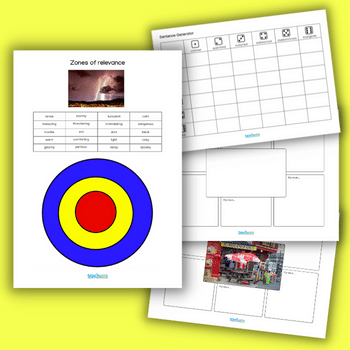
What is an expanded noun phrase?
Expanded noun phrases add extra information to a noun by adding one or more adjectives (a word that describes a noun).
For example: a tiny flower, some magical creatures, the grand, old palace
Expanded noun phrases can also add information by explaining where a noun is.
For example: a cat next to its bowl, some bees on the flower, the house by the meadow
The BBC Bitesize page for expanded noun phrases takes students through the basics of noun, noun phrase and expanded noun phrase in a clear manner, before tasking them to highlight the expanded noun phrases in an example passage.
JUMP TO A SECTION
How to teach expanded noun phrases
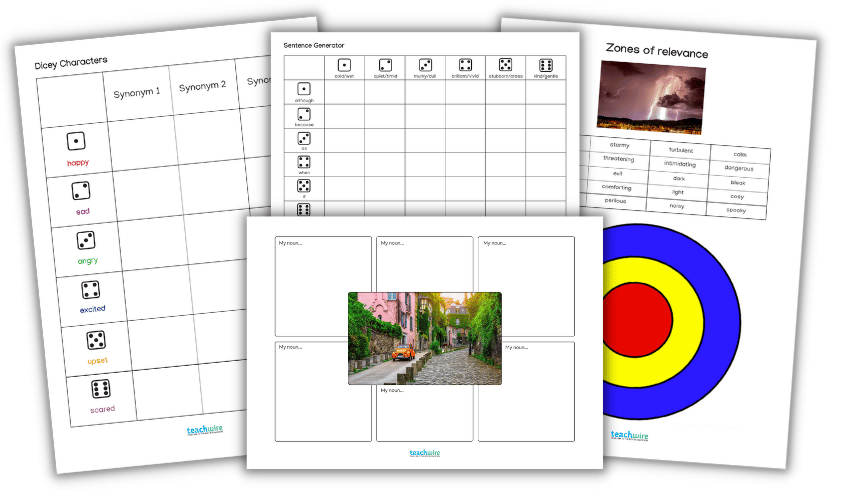
Use teacher Rebecca Jakes’ advice and our downloadable resources to help pupils get to grips with this area of KS2 grammar…
It’s been years since there were changes to grammar, punctuation and spelling in the curriculum, yet the teaching of specific grammar terminology is still the cause of many Twitter spats, lively debates and teachers pulling their hair out in the staffroom.
So why after so long, is grammar terminology still an issue – and does it need to be? My answer is no.
For me, the answer is keep it simple and fun, learn it in context and practise with daily drip-feeding of terminology. As teachers we plan immersion into new vocabulary with every unit we teach, so teaching expanded noun phrases should go hand in hand with this.
Here I share my favourite strategies and activities for teaching expanded noun phrases.
Activity 1 | Say Six Things

This activity is called ‘Say six things’ and really is as simple as it sounds. Add a picture stimulus to the centre box or use our examples.
To begin with, ask children individually or in pairs to write six nouns that they can see in the picture. For example, for this picture they might write ‘trees’, ‘leaves’, ‘branches’, ‘elephant’, ‘grass’ and ‘river’.
Now move on to expanding the ideas. Give each child or pair some small sticky notes and ask them to choose an adjective to describe each noun, then write them on the sticky notes. I always paraphrase when using terminology – I have no problem at all with reminding children that adjectives are describing words if it helps them remember it.
Place the notes over the boxes they have written the nouns in. Repeat two or three times until each box is covered with several layers of notes.
For some reason, when the sticky notes come out, even the most reluctant writers want to join in. It never fails to get great outcomes.
This is a lesson in itself and it’s important not to rush the teaching and generation of vocabulary. By gathering responses each time by asking for nouns and adjectives you are revising pupils’ prior knowledge of this terminology.
It’s also the perfect opportunity to address any misconceptions about word meaning.
“When the sticky notes come out, even the most reluctant writers want to join in”
The following lesson can then be dedicated to turning these ideas into expanded noun phrases. Modelling is the key here, with explicit labelling of terminology every time.
This activity is an easy and adaptable activity and a great way to teach thesaurus skills. It’s also a perfect opportunity to discuss the ‘appropriateness’ of a word.
Activity 2 | Character Slinky
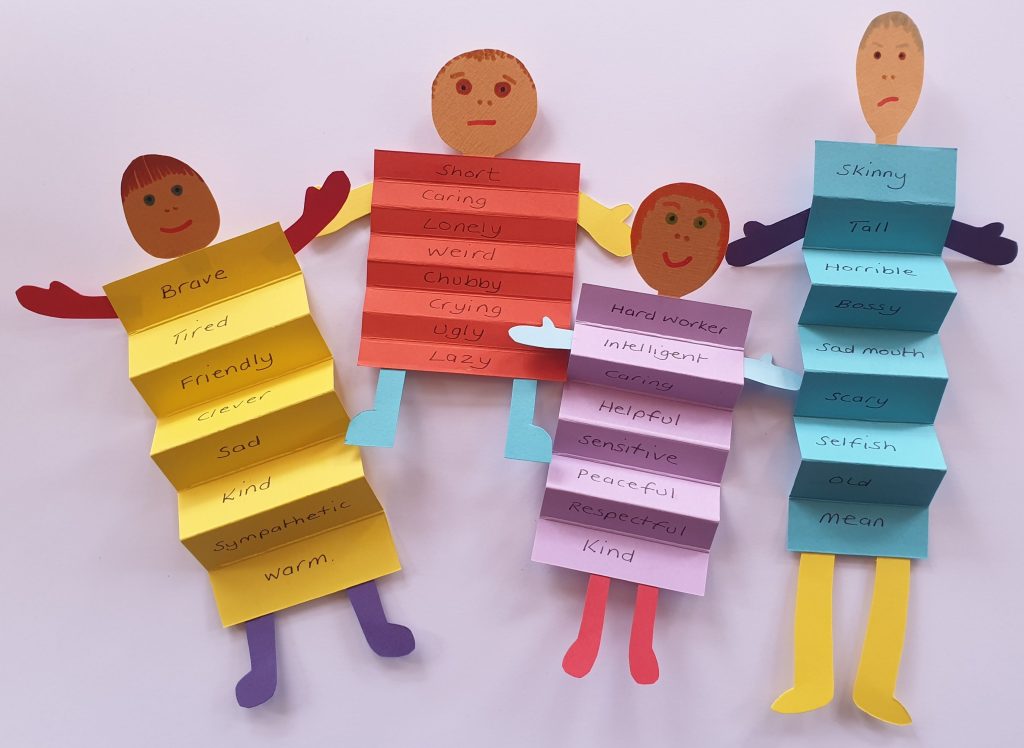
A character slinky is a fun way to teach expanded noun phrases. It’s particularly effective with SEND pupils and supports EAL pupils with learning adjectives.
Fold a narrow length of card concertina style (like a fan). Open out the card to create a character body. Ask children to attach a head, arms and legs to their card before adding a different adjective in each space created by the concertina.
To extend this activity, prompt children to focus on specific nouns related to their character as they add them – nose, eyes, legs, for example.
This helps encourage children to look deeper into a character rather than think of the most basic adjectives.
Once the character slinkies are filled up, model turning the ideas into expanded noun phrases, then move to using these in full sentences.
Activity 3 | Dicey Characters and Settings
The great thing about teaching grammar in context, rather than as a stand-alone lesson, is that you can kill two birds with one stone. Expanded noun phrases are a great way to revise commas in a list at the same time.
This activity works particularly well as a morning starter and can be completed as a thesaurus/synonym activity. The best thing about it is it teaches ‘feelings’ vocabulary, which pupils invariably find difficult.
I can’t be the only teacher who despairs when they hear the words ‘joyful’ and ‘forlorn’ as a synonym for happy and sad. Where do they get this from? It’s not me!
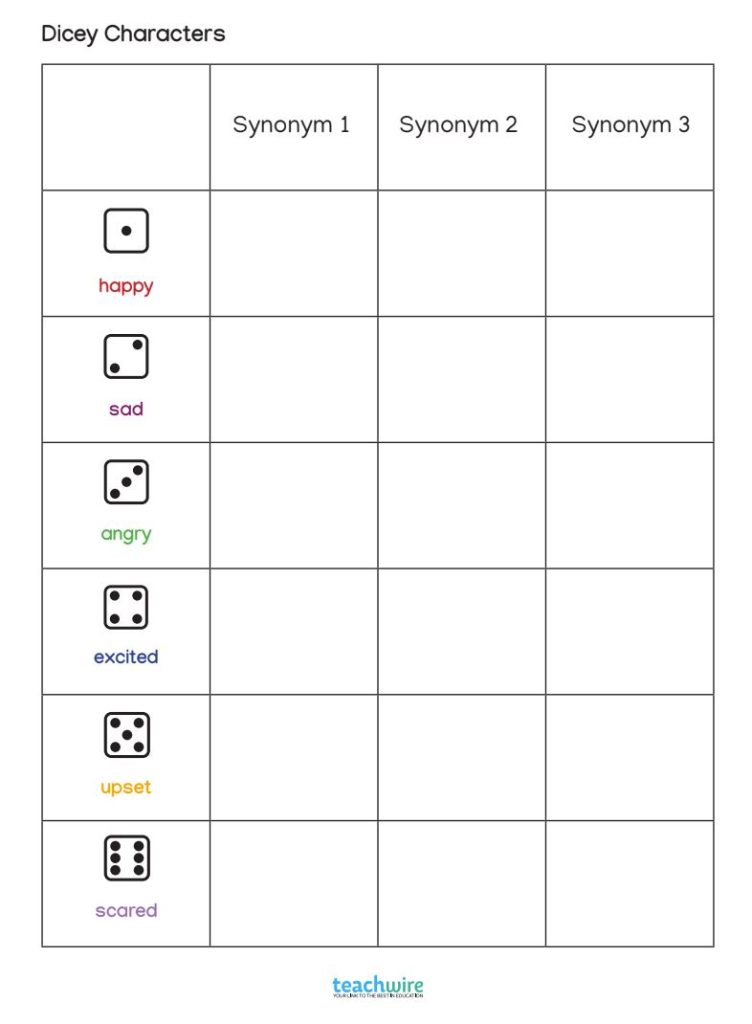
Using this resource, let children fill in six adjectives in the first column, or use our examples. Children must first roll a dice to see which adjective they need to find a synonym for.
For example, if a child rolls a one they must then find synonyms for the word ‘happy’ and fill them in in the three boxes along the row – ‘cheerful’, ‘jolly’ and ‘smiling’, for example. Continue the activity until the table is complete.
Next, looking at a picture you have provided or their own character or setting, pupils must choose two appropriate adjectives to turn into an expanded noun phrase in a full sentence.
For example, if their image is of the BFG, they might write, “The jolly, smiling giant grinned fondly at Sophie.”
Activity 4 | Sentence Generator and Zones of Relevance
Children working at greater depth are likely to grasp the use of expanded noun phrases quickly. To enable them to work at greater depth from a grammar point of view, the following two resources can be adapted and used again and again.

A sentence generator enables pupils to generate adjectives and conjunctions with the roll of a dice. The challenge here is that children must build a sentence around these given words by selecting an appropriate noun.
For example, if a child rolls a one then a three, they must include the words ‘although’, ‘murky’ and ‘dull’ in a sentence. The challenge here is that all the other words they use must be appropriate too.
So a child working at greater depth might come up with an expanded noun phrase in a sentence like this: “Although the sun was out, it was murky and dull in the forest.”
Get children to record the words they’ve used by putting an ‘X’ in the box. They can then roll the dice again and repeat the activity a number of times.
Be sure to model the activity carefully first to ensure children fully understand what they need to do.
Once pupils become confident with a thesaurus, they can also be challenged with a ‘zones of relevance’ board to make their expanded noun phrases even more effective.
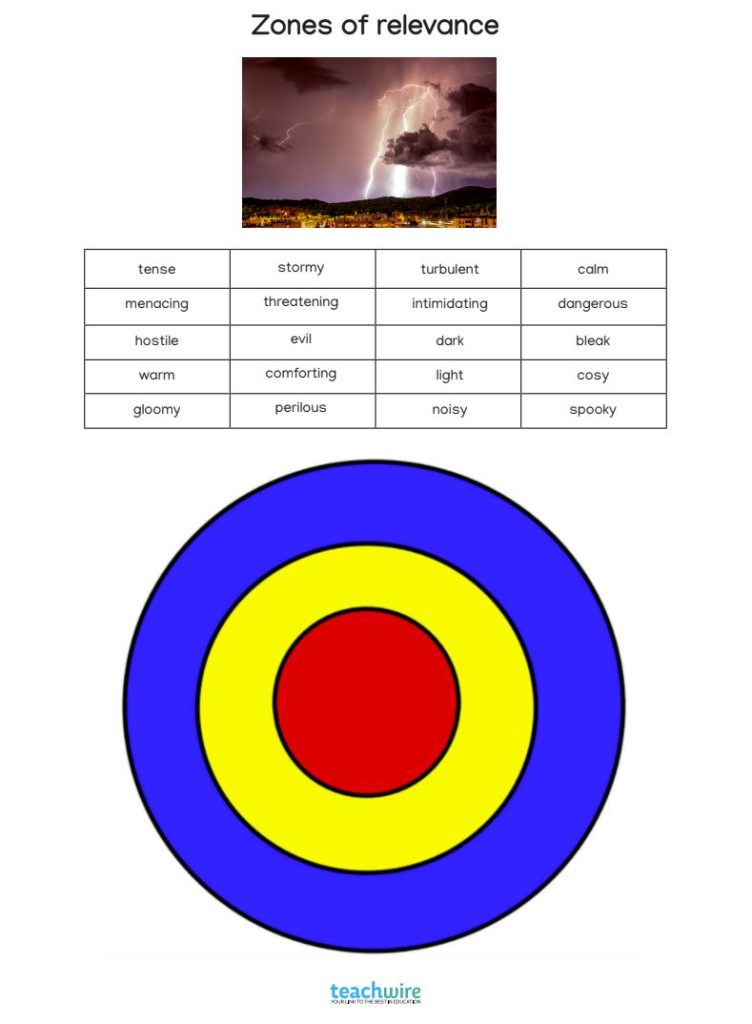
Give children a stimulus and words to accompany it. They must decide how relevant the words are in the context of the stimulus. If a word is irrelevant, put it outside the circle. If it is relevant, decide how relevant – the more relevant it is, the closer it must be to the centre.
Once pupils have decided, they can then use the relevant vocabulary to create sentences containing expanded noun phrases.
- Use paraphrasing alongside the terminology to support children who haven’t grasped it. The more you do this, the more they will remember it. Prompt cards with pictures can help.
- ‘Drip feed’ the terminology – daily practice during lesson starters will help pupils become fluent. Keep it simple with a picture stimulus and ask pupils to pick out the nouns, then add adjectives to describe them. Then ask children to create sentences which contain expanded noun phrases.
- To support SEND pupils, give basic picture cards of nouns and cards with adjectives on. Match the cards to the appropriate adjectives.
- Give opportunities to practise during reading sessions – ask pupils to find examples of expanded noun phrases in their guided reading book as an independent follow-up task.
- Use visualisation to show the importance of expanded noun phrases. Read aloud a basic setting description with no adjectives and ask pupils to draw what they hear. Repeat with a description containing expanded noun phrases. How do the two pictures compare?
- Use different colours to underline noun phrases and adjectives to show how the adjectives expand the noun phrase.
More expanded noun phrases resources
Expanded noun phrases SPaG challenge mat
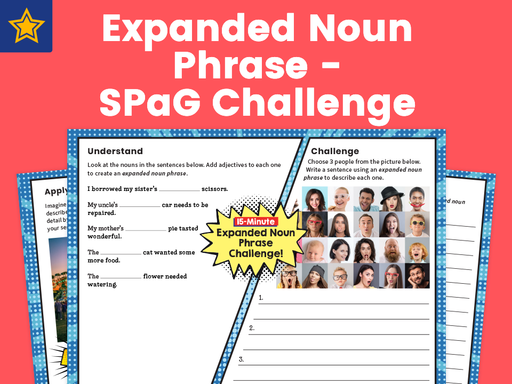
This Year 2 review mat from Plazoom is an excellent way to revise and practise using expanded noun phrases.
The worksheets are divided into five different types of activity, including writing challenges and GPS sample test questions.
Expanded noun phrase examples
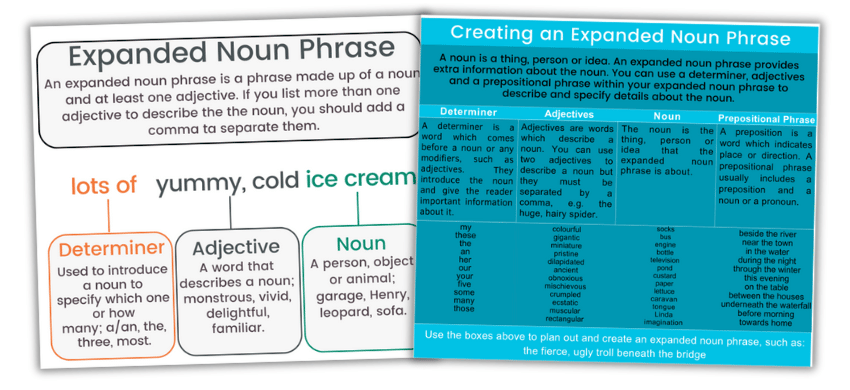
This free download includes an expanded noun phrases poster and a phrase builder worksheet to help pupils build their confidence.
KS1 noun phrase generator
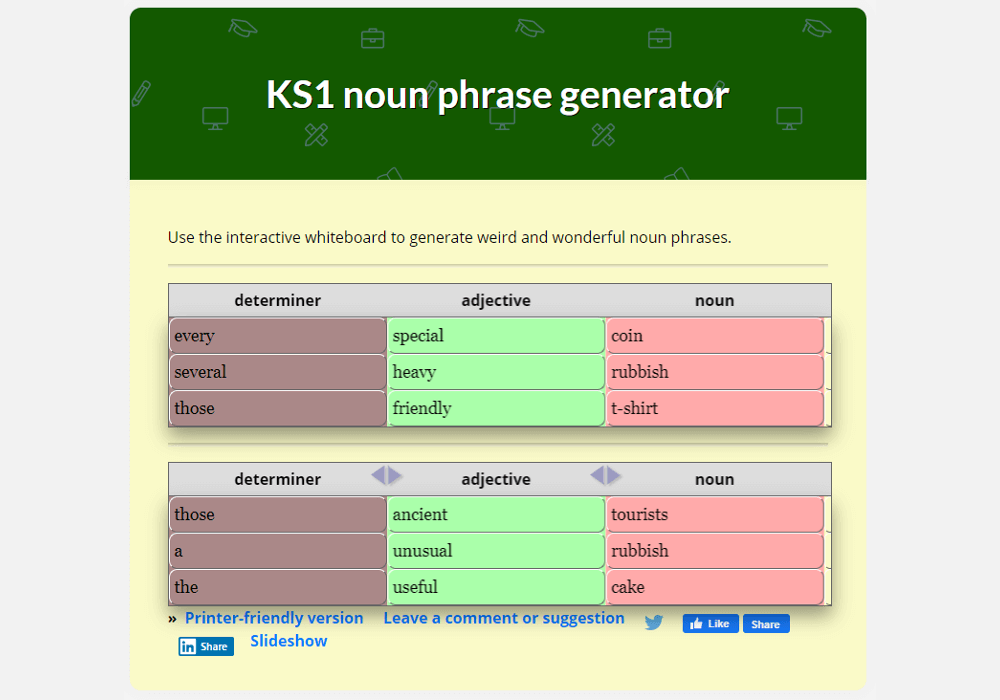
This interactive activity lets you scroll through determiners, adjectives and nouns to create weird and wonderful noun phrases.
Describing animals and monsters
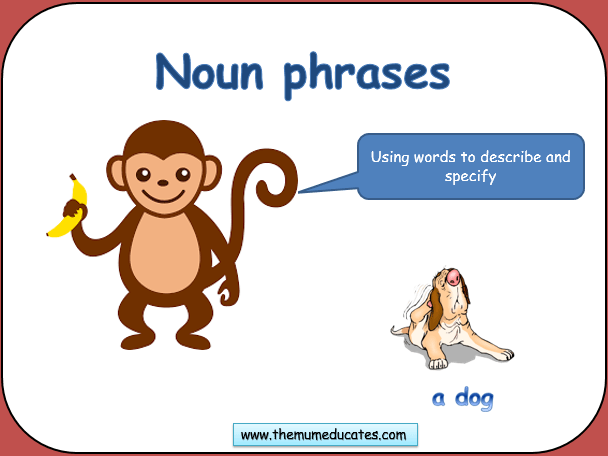
This article runs through expanding noun phrases and includes three downloadable activities to try in class. There’s a PowerPoint to try expanding noun phrases as a class and two printable PDF activities. One focuses on describing dragons and one is for writing about animals.
Where’s Wally? writing activity

Everyone loves a bit of Where’s Wally?, and giving the kids a reason to scour the detailed pages in class certainly won’t feel like work, so this idea is sure to go down a treat.
The idea here is to pick someone in the picture and say “Can you find the smiling, strong man? Too hard? OK, can you find the tall, strong, smiling man with a blue hat and an axe?”.
Then, as a writing activity, children come up with their own descriptions for characters in the pictures for their friends to use in order to find them.
Expanded noun phrases song
Clicking on an educational song on YouTube is always a bit of a gamble. The quality can vary wildly, shall we say.
So it was with great pleasure to find this punky ditty that features a bunch of good examples of expanded noun phrases that use adjectives before the nouns and prepositions after them.
Expanding sentences
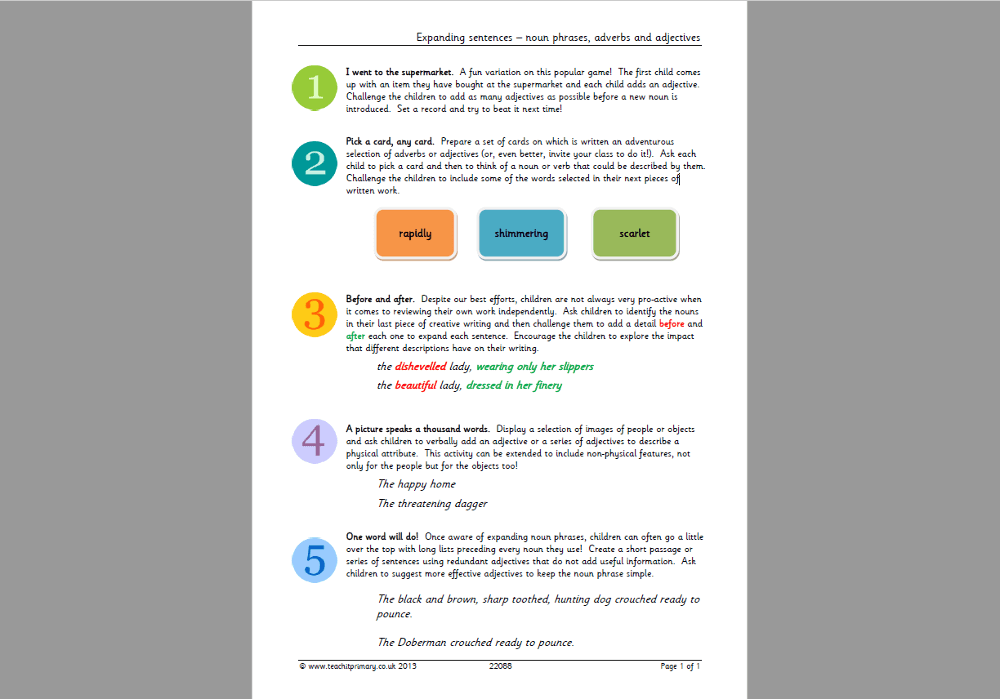
This worksheet features a set of teaching tips and ideas to help aid the teaching of expanding sentences through the addition of noun phrases, adjectives and adverbs.
There are five activities in all: ‘I went to the supermarket’, ‘Pick a card, any card’, ‘Before and after’, ‘A picture speaks a thousand words’ and ‘One word will do’.
Convey information concisely
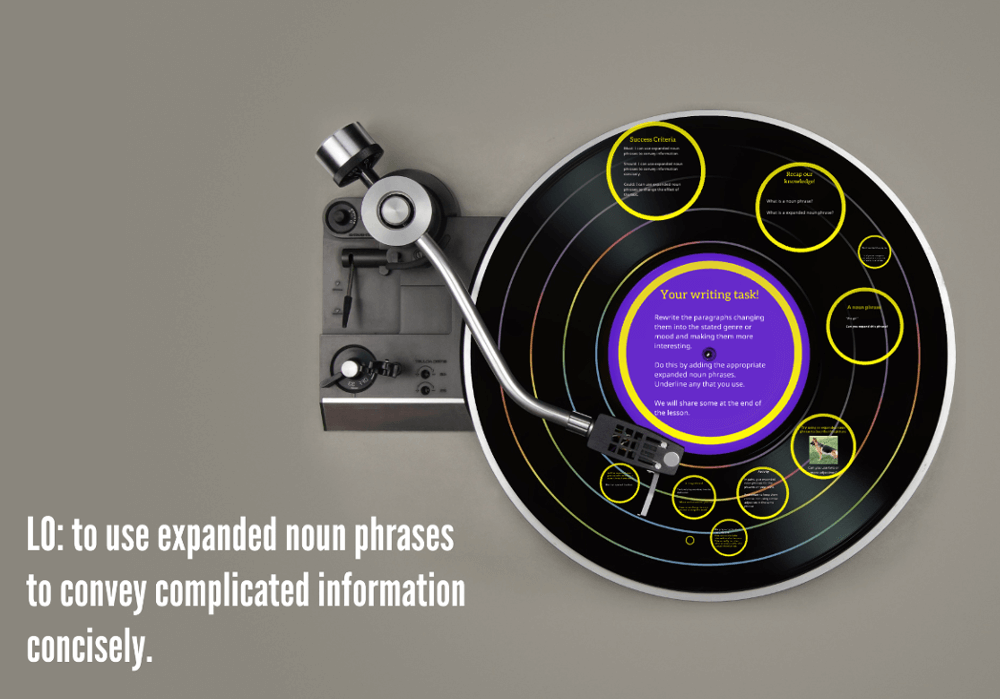
This presentation helps explain how expanded noun phrases can be used to convey complicated information concisely.
It includes some short, simple activities for students, such as asking them to expand the sentence ‘The man opened the door’ to make it into something suitable for a horror story, and changing the noun phrases ‘The lonely boy stumbled into the dark room’ to alter its mood.
How to teach noun phrases without misconceptions

Literacy consultancy director Rachel Clarke explains that if we oversimplify teaching noun phrases then children will carry their misconceptions with them throughout school and beyond…
We’ve all been told that adding an adjective before a noun will tell us more about that noun and help our readers visualise our descriptions, but is that all there is to know about noun phrases?
In the first instance, we need to recognise the role of nouns as words that name people, places, objects and ideas.
Then, almost as I’ve suggested above, we can begin to build noun phrases by adding further words to tell our readers more about those nouns.
Not just about adjectives
The thing is – it’s not just about adjectives. Let’s start with the noun ‘gate’ and look at how we can add further words to create a noun phrase.
- gate (noun)
- a gate (noun phrase)
- the red gate (noun phrase)
- a gate with a yellow handle (noun phrase)
- the red school gate with a yellow handle (noun phrase)
First off, it’s worth noting that once we attach a determiner to a noun, we’ve created a noun phrase. We should also note that determiners is a very broad term that includes words such as a, an, the, some, those and even numbers such as one.
“Once we attach a determiner to a noun, we’ve created a noun phrase”
Quite understandably this can seem a little mind-bending, which I suspect is something to do with being told that noun phrases are formed by adding adjectives to nouns.
‘The red gate’ feels like a good, solid noun phrase, and so it is. It specifies the colour of the gate, which really helps the reader to visualise it. And if you want to examine the word categories being used, it consists of a determiner, an adjective and a noun.
Busting myths
Moving on to ‘the red school gate’ the noun ‘gate’ has been yet further expanded. Not only do we know about its colour, we also know what type of gate it is: a school gate.
It’s a cracking example for busting the myth that an expanded noun phrase needs to include at least two adjectives.
‘Red’ is certainly an adjective, but ‘school’ is a noun which is being used to give us some very specific information about the gate. Sometimes we can add information after noun in order to create a noun phrase.
This is what we see in the examples ‘a gate with a yellow handle’ and ‘the red school gate with a yellow handle’. In both of these examples we’ve added a prepositional phrase to the noun ‘gate’ in order to describe it in greater detail.
They’re both expanded noun phrases, even though one has very little information before the noun and the other has lots.
The eagle-eyed amongst you will also have noticed that ‘a yellow handle’ is in fact another noun phrase used within the prepositional phrase to tell us more about the gate!
Favourite ways to teach noun phrases
It’s a lot to take in, but once you’ve tuned your eyes into spotting the different ways that words can be added to a noun to form noun phrases, you’ll be spotting them everywhere, including in your children’s writing.
So, what can you do to teach children about noun phrases? Here are a few of my favourites.
Use picture books that include detailed images
Ask children to label the nouns in the images and then to expand them to form noun phrases. This is easy to differentiate to match the stage and age of the learners so that younger children add adjectives, whereas older children write expanded noun phrases that use prepositional phrases after the noun.
Provide partially completed noun phrases
Provide the class with a partially completed noun phrase, eg ‘the red school gate with…’. Take turns to complete the noun phrase.
It doesn’t matter if the noun phrase is silly or doesn’t make total sense, it’s all about learning a structure that they recognise and replicate in their own writing.
Investigate book titles
Challenge children to find noun phrases in the titles of books in the reading area eg The Cat in the Hat, Harry Potter and the Prisoner of Azkaban, The Little Prince.
Children could sort the titles into those that add information before the noun and those that add information after the noun.
Challenge children to select and use their noun phrases within sentences. You can add rules such as:
- use your noun phrase in a sentence that starts with a fronted adverbial
- use your noun phrase within dialogue
Provide children with extracts from texts that include lots of noun phrases. Ask them to mark the noun phrases. Extend the task by asking them to expand the noun phrases further. For example, add a prepositional phrase or further information before the noun.
Where to find noun phrases
One of the most important things to bear in mind when teaching any aspect of grammar is that it doesn’t stand alone or exist in a bubble.
Noun phrases are an essential part of sentences. One of the best places to find great sentences is in authentic children’s books.
Noun phrases are such a key part of writing that you won’t struggle to find examples. However, some books are particularly good to share with children at different ages and stages of development.
“One of the best places to find great sentences is in authentic children’s books”
- Red Rockets and Rainbow Jelly by Sue Heap
This is the perfect starter text for the youngest children. Over the course of the book, children see how descriptions are improved by adding adjectives. It’s also a great book for teaching children to use ‘and’ to join words and phrases. - Titch by Pat Hutchins
This book contains lots of easy to replicate noun phrases where the expansion comes before the noun. - The Three Little Wolves and The Big Bad Pig by Eugene Trivizas
From the title onwards, this book oozes with noun phrases expanded both before and after the noun. As a twisted traditional tale it delights readers and is certainly not beyond the interest level of children in KS2. - Firebird by Saviour Pirotta
This one of my all-time favourite books for teaching noun phrases expanded with prepositional phrases. It’s also an excellent book for learning about traditional tales from other parts of the world. - Hairy Maclary from Donaldson’s Dairy by Lynley Dodd
Surprisingly, I’m not suggesting this book for the youngest children but instead for the oldest. Each character’s name is an expanded noun phrase where the expansion comes after the noun. To make things even more challenging, you’ll see prepositions, non-finite clauses and similes all being used to expand the names of the characters. It’s incredible stuff.










